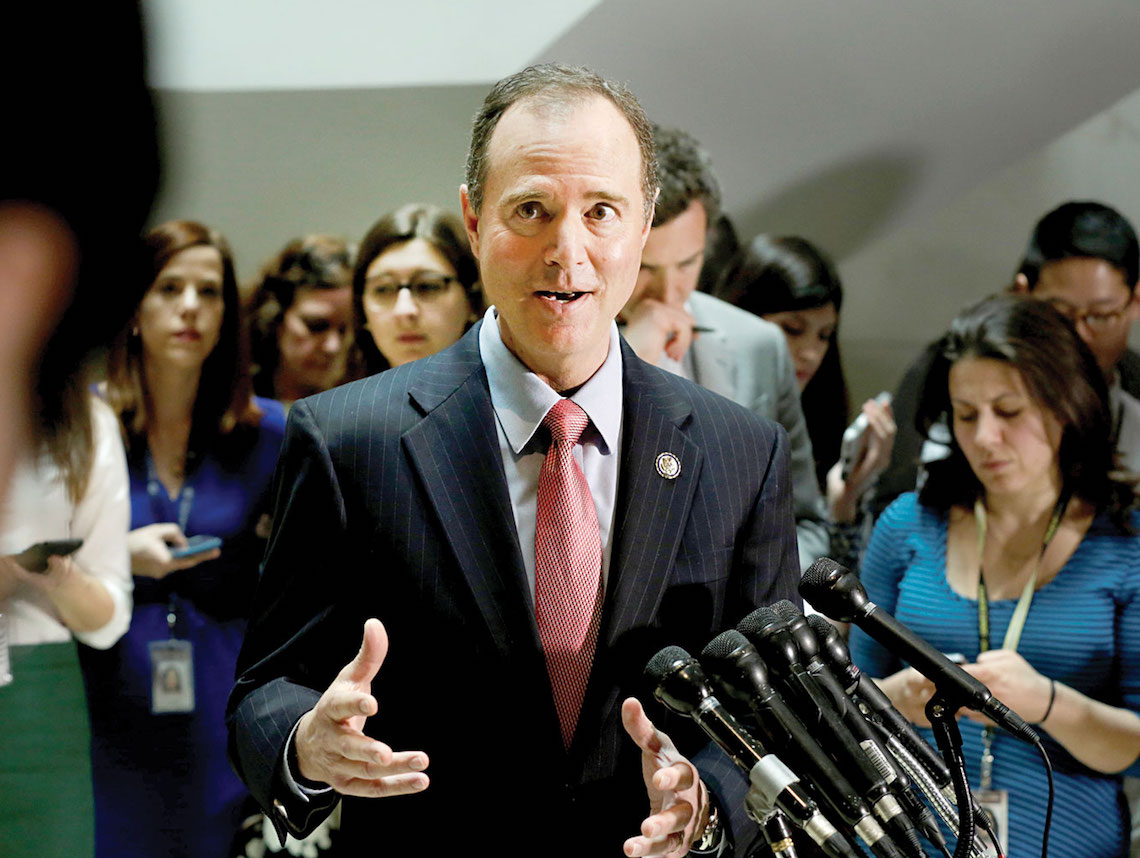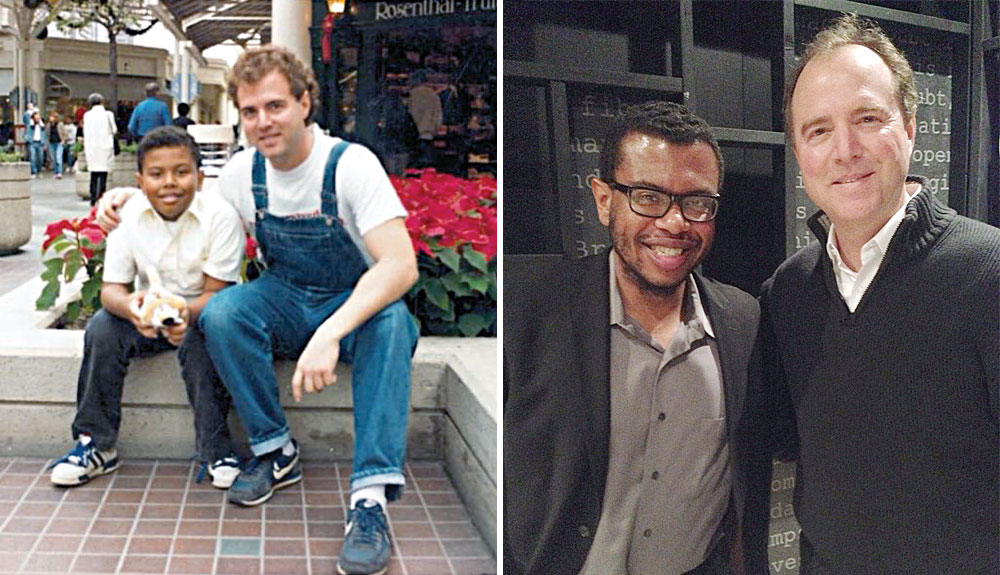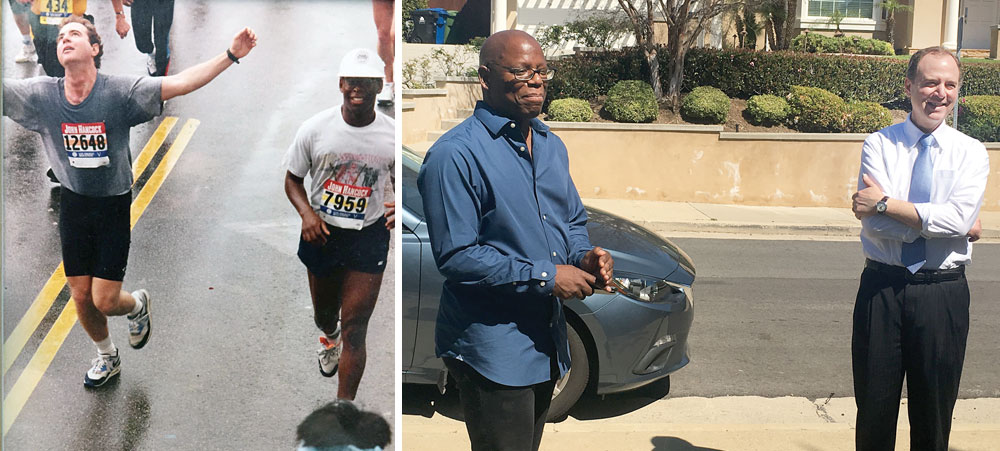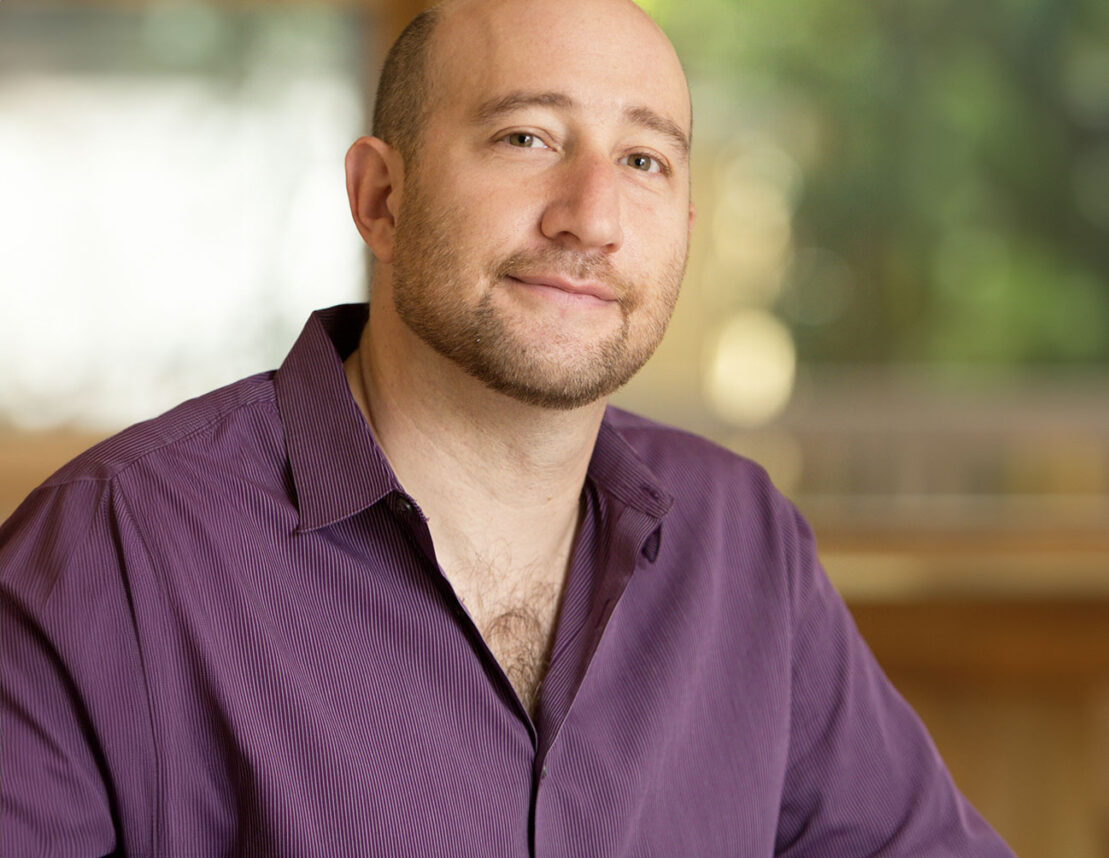 Rep. Adam Schiff speaks with reporters on Capitol Hill on March 30 about the House Intelligence Committee’s investigation into Russian meddling in the 2016 election. Photo by Yuri Gripas/Reuters
Rep. Adam Schiff speaks with reporters on Capitol Hill on March 30 about the House Intelligence Committee’s investigation into Russian meddling in the 2016 election. Photo by Yuri Gripas/Reuters This is hardly the first time Adam Schiff has had Russia on his mind.
Years ago, and long before he was elected to the U.S. House of Representatives, Schiff was a United States Attorney in Los Angeles who led the prosecution of an FBI agent convicted on spy charges.
“Sex for secrets,” he recalled in a telephone interview with the Jewish Journal last month. “He was seduced by an attractive KGB asset named Svetlana — they’re always named Svetlana. I had to work extensively with the FBI even though it was the first time an FBI agent was ever indicted for espionage. … It’s so odd to be working on a case again involving the bureau and Russia. But it does feel like it’s come full circle.”
Congressman Adam Schiff, 56, is one of 18 Jews serving in the House, and these days, one of the most prominent of the chamber’s 193 Democrats. He’s been everywhere lately — a guest on CNN and MSNBC, a focus of stories in The New York Times and The Washington Post. His Twitter following is growing exponentially. Already, people are suggesting he could become a presidential candidate in 2020.
And all this for one reason: Schiff is the ranking member — the top Democrat — on the House Permanent Select Committee on Intelligence, which is investigating whether the Russian government interfered with the 2016 presidential election and whether anyone in the Trump campaign had a role in it.
With Democrats in the minority, Schiff has only so much power in setting the panel’s agenda. Nonetheless, he has emerged as a forceful counterweight to President Donald Trump’s defenders, who insist the current investigations into Russia’s election activities — the Senate and FBI are holding their own probes — are little more than politically motivated witch hunts designed to undermine the Trump presidency.
“The American people do have a strong center of gravity that will constrain [Trump’s] worst impulses, so I’m a believer in our democracy.” — Adam Schiff
Undaunted, Schiff is pressing ahead, an effort that draws together the most salient parts of a life in public service — his Judaism, his law background, four years in the California Senate and his 16-plus years in the House — not to mention his role as a Big Brother to a young African-American boy who Schiff’s father, Ed Schiff, says made Adam “a better person.”
It’s a foundation that also has cemented his confidence in American institutions despite the current chaos of Washington.
“I think our democracy is resilient enough; we’ll get through this, I think, even if the president doesn’t operate within established norms of office,” Schiff said. “The American people do have a strong center of gravity that will constrain his worst impulses, so I’m a believer in our democracy. I think we’ll get through this. But certainly, there are some rough roads ahead.”
Schiff was born in Boston in 1960, a few months before John F. Kennedy was elected president, as the younger of two sons to Ed and Sherri Schiff. Theirs was a mixed marriage: Ed, who now lives in Boca Raton, Fla. — “living the ‘Seinfeld’ life,” his son said — is a Democrat; Sherri, who died around 2009 of complications from Alzheimer’s disease, was a Republican.

Adam Schiff poses during his bar mitzvah in June 1973 at Temple Isaiah in Northern California. Photo courtesy of Ed Schiff
Ed Schiff was a businessman who moved around the country as a regional sales director for Farah, a men’s pants manufacturing company. Sherri, “bored with country club life … went into real estate, where her boss said, ‘You are wasting time writing copy. Why don’t you get into sales?’ ” Ed said.
After a few years of living in Arizona, the Schiffs moved in 1970 to Contra Costa County in the Bay Area, where Ed got out of the “rag business,” as he called it, and purchased a building materials yard.
In those days, Adam was a studious boy who, according to his father, always did his homework, adored his mother and had a friendly sibling rivalry with his older brother, Dan, a relationship Adam would later write about in a screenplay — never produced — called “Common Wall.” Adam became a bar mitzvah at Temple Isaiah, a Reform congregation in Lafayette, Calif., in June 1973.
“I certainly do remember making tape recordings of my [bar mitzvah] practice sessions on cassette tape with a little cassette recorder, and I think I may even have one of those,” Schiff said. “It’s funny to hear your voice back then.”
In 1978, he entered Stanford University. A pre-med student, he also studied political science, and upon graduation, he was unsure if he wanted to pursue law or medicine. He decided on the former and enrolled at Harvard Law School.
After graduating in 1985, he clerked for federal Judge Matthew Byrne, a Los Angeles native who presided over the trial involving Daniel Ellsberg and the Pentagon Papers. Later, Schiff spent six years as an assistant U.S. Attorney in L.A. During that time, he met his wife, Eve Sanderson Schiff — yes, they’re Adam and Eve — and prosecuted Richard Miller, the FBI agent convicted of espionage.
Schiff’s success against Miller, as well as Byrne’s influence, accelerated his interest in politics.
“After Adam convicted the FBI agent of treason, he called me and said, ‘Dad, can you imagine what it’s like to have representatives of the most powerful nation in the world calling you and offering to help you in any way they could? Dad, I will never have another case like that in my life,’ ” Ed recalled his son saying. “ ‘I’m going into politics.’ ”
Twice he ran unsuccessfully for the California Assembly but promised his supporters he would do better next time. In 1996, he was elected to the State Senate.
“Adam takes things in progression, and the learning curve … with each loss made it that much easier the next time,” his father said.
In 2000, Schiff ran for Congress to unseat Republican James Rogan in what was then the most expensive House race of all time. Rogan was a two-term Congressman who had his own national profile, in part, from working to impeach President Bill Clinton. Schiff sought help from his mother, asking if she’d make phone calls to voters on his behalf.
“He said, ‘Mama, I would like you to do something for me. I would like you to call these people and tell them a little about me and ask them to vote for me. She jumped into that for 2 1/2 years like it was eating ice cream,” Ed said. “Her spiel went like this: ‘Good evening. My name is Sherri Schiff. My son Adam is running for Congress in your district. May I tell you a little about him?’ ”
Schiff currently is serving in his ninth two-year term in the House, representing a district that now extends from West Hollywood to the eastern edge of Pasadena and from Echo Park to the Angeles National Forest. He has a reputation as a moderate who works with members of both parties. With a large constituency of Armenians, he has championed legislation that would formalize United States recognition of the Armenian genocide of 1915-17. He once delivered an entire speech on the House floor in Armenian and worked with the Armenian members of a hard-rock band, System of a Down, toward seeking recognition of the genocide.
Regarding Israel, which is never out of the headlines, he said, “I’m deeply concerned with a trend I’ve seen over the last several years, where the U.S.-Israel relationship, which always had been very bipartisan regardless of who was in office in Israel or in the U.S., has been trending toward a situation where you have a GOP-Likud relationship and Democratic relationship with other parties in Israel. I think that’s a very destructive trend.”
In 2015, as Jews became polarized over the Iranian nuclear agreement, Schiff considered both sides, then came out in favor of it. Recently, he expressed concern that in the event Trump believes Iran has violated the agreement by developing a nuclear weapon, the president’s outlandishness on Twitter and elsewhere will undermine his credibility in efforts to galvanize allies into action against Iran.
“I have been so appalled by this president’s conduct. I feel I have to vigorously oppose his efforts to undermine our system.” — Adam Schiff
“If they are cheating and the president calls them out on it and thinks there should be some response to it, will the country believe it?” he asked. “The allies we’d need to participate with us, would they believe us? The intelligence agencies that he’s maligning? This is the reason why presidential credibility is to be treasured and not squandered.”
Like Trump, Schiff uses Twitter to communicate his positions. One of his most shared tweets — more than 43,000 retweets and nearly 83,000 likes — addressed Trump’s tweet aimed at the “so-called judge” who had blocked his executive order barring individuals from seven Muslim-majority countries from entering the U.S.:
“This ‘so-called’ judge was nominated by a ‘so-called’ President & was confirmed by the ‘so-called’ Senate. Read the ‘so-called’ Constitution.”
Tweets aside, Schiff’s 17-minute opening statement during the Intelligence Committee’s first public hearing on Russia on March 20 was less attack-dog and, befitting his usual public demeanor in television interviews, more lawyerly. He cited events of the presidential campaign that could suggest coordination between Russians and the Trump campaign, improving the Republican’s chance of victory.
“Is it possible that all of these events and reports are completely unrelated and are nothing more than an entirely unhappy coincidence? Yes, it is possible,” Schiff said, addressing FBI Director James Comey and Michael Rogers, director of the National Security Agency. “But it is also possible, maybe more than possible, that they are not coincidental, not disconnected, and not unrelated, and that the Russians used … techniques to corrupt U.S. persons. … We simply don’t know.”
In the interview with the Journal, he said, “I have been so appalled by this president’s conduct. I feel I have to vigorously oppose his efforts to undermine our system, and so, I certainly think there is more than a grain of truth to the idea this is a different kind of role for me.”
Rabbi David Wolpe of Sinai Temple in West L.A. met Schiff five years ago at a memorial service at Forest Lawn-Hollywood Hills. Wolpe was leading the service, and Schiff said he was impressed with how eloquently and powerfully he spoke. The two struck up a friendship, exchanging book recommendations via email. The first book Schiff recommended to Wolpe reflected Schiff’s earlier involvement with Russia. It was “Eugene Onegin,” a masterpiece by the Russian novelist Alexander Pushkin.
“When he’s in town, we have lunch,” Wolpe said. “I talk a little bit about politics, but we talk a lot about literature and life.”
“When I saw him at AIPAC [in March], I told him how proud I am of how he’s been conducting himself,” Wolpe continued. “He’s in a tricky position. This is a very fraught time and I think he has conducted himself with a great deal of dignity. I am not trying to take political sides; I try my best not to. I think he is a nice, thoughtful, decent, caring and very intelligent man, so I’m impressed with him.”
Schiff’s own rabbi concurs.
“I felt personally very proud that Adam has taken stances on issues that really move him personally, and he hasn’t backed down on that,” said Rabbi Baht Yameem Weiss of Temple Beth Ami in Rockville, Md., a suburb of Washington, D.C.
“From where I sit, I think he’s certainly one of the leaders in the Democratic Party right now.” — Ed Schiff, father of Adam Schiff
For all his supporters, not everyone appreciates his approach to the investigation.
“Adam Schiff is a bright guy. He’s a talented legislator, but right now, instead of focusing on the substance of the investigation, he’s focusing on politics and partisanship,” Ken Khachigian, a San Clemente-based Republican strategist and former senior adviser to President Ronald Reagan, told the L.A. Daily News last month.
Schiff and his wife, who is Catholic, are raising their two children, Alexa, 18, and Elijah, 14, Jewish. The family has belonged to Temple Beth Ami since 2010. They formerly belonged to Temple Sinai in Glendale. Alexa is involved with the Hillel at Northwestern University, where she is a freshman. She has traveled to Israel with a Jewish summer camp and will be working as a counselor at the camp this summer, Weiss said.
As a House member, Schiff said he draws on the Jewish tradition of tikkun olam (repairing the world) to influence his work in Congress.
“We have a responsibility to mend the torn fabric of the world,” he said.
For all of his success as a prosecutor, state legislator and congressman, it might have been his experience with a Black kid from Inglewood that has shaped Schiff most. In his mid-20s, fresh out of law school, he volunteered to become a “big brother” through Big Brothers Big Sisters of Greater Los Angeles. He was paired with David McMillan, a child of a single mother who needed a male role model for her son.
The two hit it off immediately, bonding over “The Big Lebowski,” Billy Joel and the beach. Three decades later, they are still part of each other’s lives. McMillan, now a television writer and playwright living in Los Angeles, was in Schiff’s wedding and recently attended Elijah Schiff’s bar mitzvah. There, Adam’s father approached McMillan and said, “I want to thank you for making Adam a better person.”
“I certainly would like to hope my relationship has had a positive impact, not just in how he conducts politics but also as a human being,” McMillan said.
“My ‘big brother’ is leading the resistance and is emerging as a leader not just of the Democratic Party but of all people who care about our democratic institutions and making sure they just survive.”

Left: In 1986, 25-year-old Adam Schiff gets together with David McMillan, his Big Brothers Big Sisters of Greater Los Angeles “little brother.” Photo courtesy of David McMillan
Right: Congressman Adam Schiff and David McMillan were paired 30 years ago through Big Brothers Big Sisters. The two would become lifelong friends. Photo courtesy of David McMillan
Speculation over Schiff’s future includes whether he might run for the Senate to succeed Dianne Feinstein, who is 83 and shares the same birthday, June 22, as Schiff. Feinstein, a senator since 1992, has not said whether she intends to seek another six-year term next year, but Schiff running to succeed her is a possibility his father won’t rule out.
“I think it would be a tremendous honor for him to step into the Senate if he wanted it, but I don’t know,” Ed Schiff said. “From where I sit, I think he’s certainly one of the leaders in the Democratic Party right now. And where that goes, how that goes, and so forth, I think it all depends on which way our country is going.”
In March, Schiff gave a speech at the Westwood home of Karl S. Thurmond, a friend of more than 30 years. In his 40-minute talk, Schiff denounced the president and expressed hope for the future of the Democratic Party before taking questions from the audience.

Left: Adam Schiff and his friend and former Harvard Law School classmate Karl Thurmond cross the finish line at the 1990 Los Angeles Marathon.
Right: Nearly 30 years after running the marathon, the two appeared together at Thurmond’s Westwood home in March. Schiff spoke before 50 of his supporters and discussed the Trump administration, the future of the Democratic Party and more.
Thurmond is an attorney and member of the Milken Community Schools board of trustees. He and Schiff were classmates in law school and both moved to L.A. after graduation, becoming part of a group that committed to becoming involved with a nonprofit to affect change. It was a pledge that led Schiff to Big Brothers Big Sisters.
They were 30 at the time, and Schiff was living in Venice. Training for the Los Angeles Marathon, he and Thurmond went on runs from Venice to Malibu and back, using the time to discuss career ambitions. Adam confided in Thurmond that he wanted to be president one day, to follow in the footsteps of his idol, John F. Kennedy.
“We would talk about our aspirations in life and one of his biggest from Day One was to run for political office so he could give back. His idol at the time, and I think still is, was President Kennedy,” Thurmond said. “I firmly believe, as he moves up, one day he will be running for president. And I can’t think of a better person to hold that office.”
For his part, Schiff declined to address his future.
“I don’t have much time even to eat lunch,” he said, “let alone think about anything other than what’s going on in the intelligence world.”























 More news and opinions than at a Shabbat dinner, right in your inbox.
More news and opinions than at a Shabbat dinner, right in your inbox.